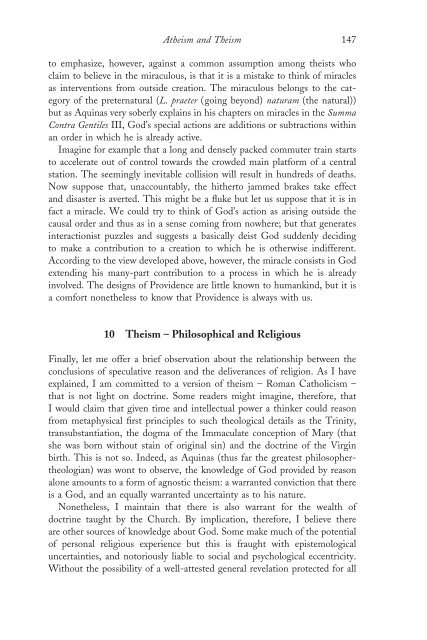Atheism and Theism JJ Haldane - Common Sense Atheism
Atheism and Theism JJ Haldane - Common Sense Atheism
Atheism and Theism JJ Haldane - Common Sense Atheism
Create successful ePaper yourself
Turn your PDF publications into a flip-book with our unique Google optimized e-Paper software.
<strong>Atheism</strong> <strong>and</strong> <strong>Theism</strong> 147<br />
to emphasize, however, against a common assumption among theists who<br />
claim to believe in the miraculous, is that it is a mistake to think of miracles<br />
as interventions from outside creation. The miraculous belongs to the category<br />
of the preternatural (L. praeter (going beyond) naturam (the natural))<br />
but as Aquinas very soberly explains in his chapters on miracles in the Summa<br />
Contra Gentiles III, God’s special actions are additions or subtractions within<br />
an order in which he is already active.<br />
Imagine for example that a long <strong>and</strong> densely packed commuter train starts<br />
to accelerate out of control towards the crowded main platform of a central<br />
station. The seemingly inevitable collision will result in hundreds of deaths.<br />
Now suppose that, unaccountably, the hitherto jammed brakes take effect<br />
<strong>and</strong> disaster is averted. This might be a fluke but let us suppose that it is in<br />
fact a miracle. We could try to think of God’s action as arising outside the<br />
causal order <strong>and</strong> thus as in a sense coming from nowhere; but that generates<br />
interactionist puzzles <strong>and</strong> suggests a basically deist God suddenly deciding<br />
to make a contribution to a creation to which he is otherwise indifferent.<br />
According to the view developed above, however, the miracle consists in God<br />
extending his many-part contribution to a process in which he is already<br />
involved. The designs of Providence are little known to humankind, but it is<br />
a comfort nonetheless to know that Providence is always with us.<br />
10 <strong>Theism</strong> – Philosophical <strong>and</strong> Religious<br />
Finally, let me offer a brief observation about the relationship between the<br />
conclusions of speculative reason <strong>and</strong> the deliverances of religion. As I have<br />
explained, I am committed to a version of theism – Roman Catholicism –<br />
that is not light on doctrine. Some readers might imagine, therefore, that<br />
I would claim that given time <strong>and</strong> intellectual power a thinker could reason<br />
from metaphysical first principles to such theological details as the Trinity,<br />
transubstantiation, the dogma of the Immaculate conception of Mary (that<br />
she was born without stain of original sin) <strong>and</strong> the doctrine of the Virgin<br />
birth. This is not so. Indeed, as Aquinas (thus far the greatest philosophertheologian)<br />
was wont to observe, the knowledge of God provided by reason<br />
alone amounts to a form of agnostic theism: a warranted conviction that there<br />
is a God, <strong>and</strong> an equally warranted uncertainty as to his nature.<br />
Nonetheless, I maintain that there is also warrant for the wealth of<br />
doctrine taught by the Church. By implication, therefore, I believe there<br />
are other sources of knowledge about God. Some make much of the potential<br />
of personal religious experience but this is fraught with epistemological<br />
uncertainties, <strong>and</strong> notoriously liable to social <strong>and</strong> psychological eccentricity.<br />
Without the possibility of a well-attested general revelation protected for all

















